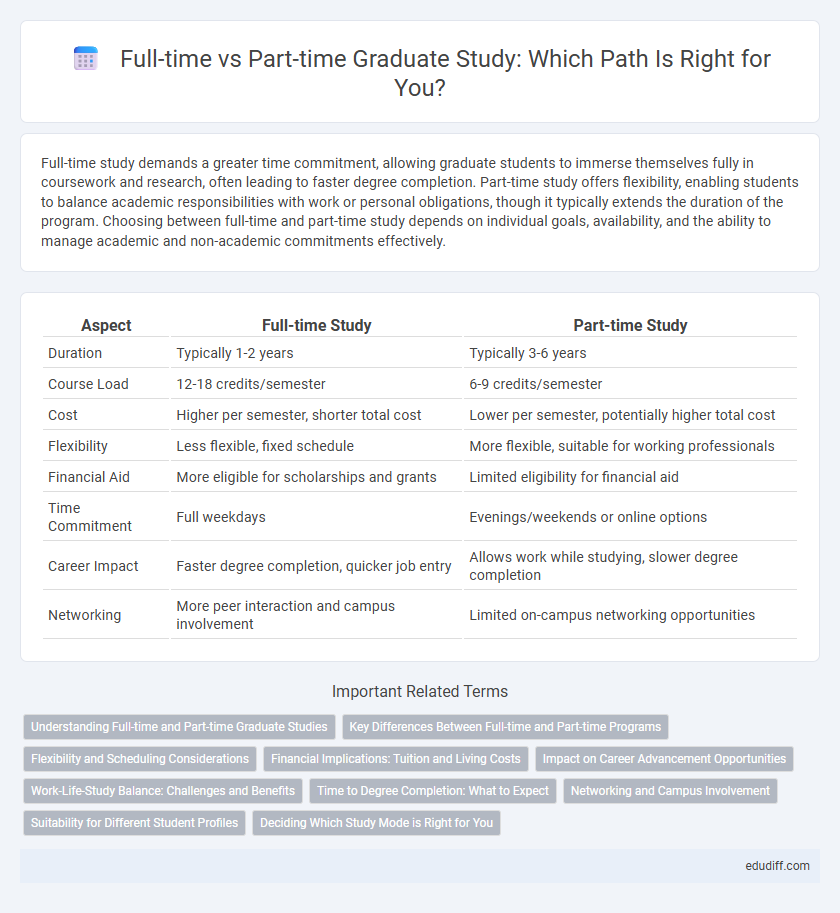Full-time study demands a greater time commitment, allowing graduate students to immerse themselves fully in coursework and research, often leading to faster degree completion. Part-time study offers flexibility, enabling students to balance academic responsibilities with work or personal obligations, though it typically extends the duration of the program. Choosing between full-time and part-time study depends on individual goals, availability, and the ability to manage academic and non-academic commitments effectively.
Table of Comparison
| Aspect | Full-time Study | Part-time Study |
|---|---|---|
| Duration | Typically 1-2 years | Typically 3-6 years |
| Course Load | 12-18 credits/semester | 6-9 credits/semester |
| Cost | Higher per semester, shorter total cost | Lower per semester, potentially higher total cost |
| Flexibility | Less flexible, fixed schedule | More flexible, suitable for working professionals |
| Financial Aid | More eligible for scholarships and grants | Limited eligibility for financial aid |
| Time Commitment | Full weekdays | Evenings/weekends or online options |
| Career Impact | Faster degree completion, quicker job entry | Allows work while studying, slower degree completion |
| Networking | More peer interaction and campus involvement | Limited on-campus networking opportunities |
Understanding Full-time and Part-time Graduate Studies
Full-time graduate studies involve enrolling in a course load that typically ranges from 9 to 12 credit hours per semester, allowing students to complete their degrees faster, often within two years. Part-time graduate studies enable students to take fewer courses per semester, usually 3 to 6 credit hours, providing flexibility for those balancing work, family, or other commitments. Understanding the distinctions between full-time and part-time graduate programs is crucial for planning academic timelines, managing financial aid, and aligning with career goals.
Key Differences Between Full-time and Part-time Programs
Full-time graduate programs require a minimum of 12 credit hours per semester, enabling students to complete their degrees faster, typically within 1 to 2 years. Part-time study allows flexibility by enrolling in fewer credits per semester, often 6 to 9, extending the duration to 3 to 5 years but accommodating work or personal commitments. Tuition fees and financial aid eligibility vary significantly between full-time and part-time enrollment, impacting budget planning and scholarship opportunities for graduate students.
Flexibility and Scheduling Considerations
Full-time study demands a fixed schedule with intensive coursework, often requiring a significant time commitment that limits flexibility for personal or professional obligations. Part-time study offers greater flexibility, allowing students to balance work, family, and education by spreading coursework over a longer period. Scheduling considerations for part-time students typically involve evening or weekend classes, which accommodate varied lifestyles and responsibilities.
Financial Implications: Tuition and Living Costs
Full-time study typically demands higher tuition fees per semester but may allow faster degree completion, potentially reducing overall living expenses. Part-time study spreads tuition costs over a longer period, easing immediate financial pressure but potentially increasing total living costs due to extended duration. Evaluating total financial implications requires considering tuition rates, duration of study, and accommodation or living expenses tied to each mode.
Impact on Career Advancement Opportunities
Full-time study typically allows graduate students to immerse themselves fully in their academic programs, leading to faster degree completion and earlier entry into advanced career roles. Part-time study offers greater flexibility, enabling professionals to gain practical work experience simultaneously, which can enhance networking and skill application in real-time. Employers often value the combination of ongoing work experience with academic development, influencing promotion prospects and career advancement opportunities differently based on study mode.
Work-Life-Study Balance: Challenges and Benefits
Full-time study demands significant time investment, often intensifying challenges in balancing work, personal life, and academic commitments, but it can accelerate degree completion and immersion in campus resources. Part-time study offers flexibility to maintain employment and family responsibilities, promoting better work-life-study balance, though it may extend the duration of graduate education. Both modes require effective time management to optimize productivity, reduce stress, and enhance overall well-being during graduate school.
Time to Degree Completion: What to Expect
Full-time graduate students typically complete their degrees in 1 to 2 years, while part-time students often take 3 to 5 years due to reduced course loads each semester. The time to degree completion directly impacts tuition costs, financial aid eligibility, and career advancement timelines. Understanding university policies and personal time management is crucial for planning an efficient path to graduation.
Networking and Campus Involvement
Full-time graduate students experience richer networking opportunities and deeper campus involvement due to their constant presence on campus and participation in events, clubs, and group projects. Part-time students often face challenges in building relationships and accessing networking resources as they balance studies with work or personal commitments. Campus involvement in full-time study enhances professional connections and access to internships, boosting career prospects post-graduation.
Suitability for Different Student Profiles
Full-time study suits recent graduates seeking immersive learning and quicker degree completion, while part-time study benefits working professionals balancing career and education. Full-time students often experience more campus engagement and access to resources, whereas part-time students enjoy flexibility to manage personal and financial commitments. Choosing between full-time and part-time study depends on factors such as work schedule, financial situation, and long-term career goals.
Deciding Which Study Mode is Right for You
Choosing between full-time and part-time graduate study depends on factors such as career goals, time availability, and financial considerations. Full-time study offers immersive learning experiences and faster completion, ideal for those who can dedicate significant hours to academics. Part-time study provides flexibility for working professionals, enabling progress without sacrificing employment or income.
Full-time Study vs Part-time Study Infographic

 edudiff.com
edudiff.com